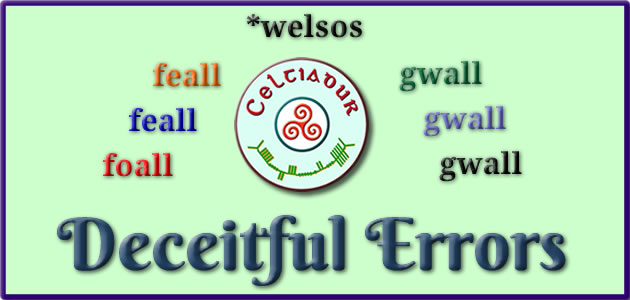Words for slow and related things in Celtic languages.
Words marked with a * are reconstructions.
| Proto-Celtic | *malnos/*mallo- = slow, lazy |
|---|---|
| Old Irish (Goídelc) | mall [mal͈] = slow, tardy, late utmall = unsteady, restless |
| Middle Irish (Gaoidhealg) | mall = slow, sluggish mallaigid = to make slow, retard maill, moill = tardiness, delay maillech = slowly-moving, leisurely, gentle admall = very slow, dilatory immall = very slow, wearisome, sad, sluggish utmall = unstable, fickle, restless |
| Irish (Gaeilge) | mall [mˠɑul̪ˠ/mˠɑːl̪ˠ/mˠal̪ˠ] = slow, late mallachar = slowness, dullness, dimness mallacharach = slow, dim mallaibh = of late, lately udhmhall = unstable, restless, unceratin, nimble, quick |
| Scottish Gaelic (Gàidhlig) | mall [maul̪ˠ] = slow, deliberate, placid mallan [mal̪ˠan] = sluggard, slowcoach mallanach [mal̪ˠanəx] = slow, dilatory |
| Manx (Gaelg) | moal = slow, sorry, tardy, unimpressive, backward, deliberate, dull, feeble, gradual, meagre |
Etymology: possibly from PIE *mel- (to be late, hesitate) and *-nós (creates verbal adjectives) [source].
| Old Irish (Goídelc) | slaet = heap, layer, pile |
|---|---|
| Middle Irish (Gaoidhealg) | slaet = a swathe, layer, pile, illness, disease slaetach, slaebach = in layers, sweeping (hair) |
| Irish (Gaeilge) | slaod = swath, layer, flowing mass, prostration, stupefication, float, raft; to mow down, lay low, flow, drag, trail, trudge slaodach = in swaths, in layers, flowing, prostrating, heavy, oppressive, viscous slaodacht = viscosity slaodaí = trudger, slowcoach, lazy-bones slaodaíocht = trudging, slowness, laziness slaodchiallach = slow-witted |
| Scottish Gaelic (Gàidhlig) | slaod [sl̪ˠɯːd] = raft, float, sledge, tow, drag, sluggard, slowcoach slaodach [sl̪ˠɯːdəx] = slow, sluggish, dilatory, dragging, pulling, awkward, clumsy slaodachadh [sl̪ˠɯːdəxəɣ] = dragging, hauling, slowing down slaodachd [sl̪ˠɯːdəxg] = slowness, drowsiness, awkwardness |
| Manx (Gaelg) | sleayd = dredge, trail, sledge, trailer sleaydagh = trailing sleayder = lug, trailing |
Etymology: unknown [source].
| Proto-Celtic | *aramo- = quiet |
|---|---|
| Middle Welsh (Kymraec) | araf, arav [ˈarav] = slow, leisurely, calm, quiet arafu = to be(come) or make slow, slow down arafaidd, arauaidd = slow, gradual, mild, gentle arafhau = to make or become quiet or calm, |
| Welsh (Cymraeg) | araf [ˈarav] = slow, gradual, tedious, tiresome, mild, meek, gentle, tender arafu = to be(come) or make slow, slow down, retard arafaidd = slow, gradual, mild, gentle, lovely, pleasant arafedd = slowness, gentleness, tenderness arafhau = to make or become quiet or calm, ease, abate, moderate arafol = slow, gradual, slowing, delaying |
Etymology: from PIE *h₁r̥h₃-mo-, from *h₁reh₃- (rest). Words from the same roots include Ruhe (calm, quietness, rest) in German, ro (calmness) in Danish, ro (peace, quiet, tranquility) in Swedish, and unruly in English [source].
| Proto-Brythonic | *segʉr = idle |
|---|---|
| Middle Welsh (Kymraec) | segur = idle segyra, segura, seguru, segvro = to (be) idle segyrllyt, segurllyd = idle, lazy, sluggish, slothful |
| Welsh (Cymraeg) | segur [ˈsɛɡɨ̞r / ˈseːɡɪr] = idle, unoccupied, inactive, lazy, slothful, disused, idle seguro = to (be) idle, laze, linger, lounge around, rest segurdod = idleness, laziness segurllyd = idle, lazy, sluggish, slothful segurwr = idler, lazy person |
| Middle Cornish (Cernewec) | sigyr, zigyr = sluggish, lazy |
| Cornish (Kernewek) | syger = idle, lazy, lethargic, slow sygera = to seep, trickle sygerans = seep(age) sygerneth = idleness, laziness, lethargy sygerus = at leisure, leisurely |
Etymology: from Latin sēcūrus (careless, carefree, negligent, safe, secure), from sē- (without) and cūra (care). Words from the same root include secure and sure in English, sicuru (safe, secure, sure) in Italian, seguro (secure, safe, sure) in Spanish and säker (safe, secure, sure, certain) in Swedish [source].
| Proto-Celtic | *uɸostatos = stable |
|---|---|
| Old Irish (Goídelc) | fossad = firm, steady |
| Middle Irish (Gaoidhealg) | fossad, fossud = stationary, fixed, firm, steady, steadfast, consistent, flat surface, level place, stopping-place, abode |
| Irish (Gaeilge) | fosadh = stop, stay, rest, stable position, steadiness, stability |
| Scottish Gaelic (Gàidhlig) | fosadh [fɔsəɣ] = cessation, desisting, recess, respite, (act of) abiding |
| Proto-Brythonic | *gwostad = (?) |
| Middle Welsh (Kymraec) | gwastat, guastat = flat, level, smooth |
| Welsh (Cymraeg) | gwastad [ˈɡwastad] = flat, level, smooth, even, horizontal, continual, constant, quiet, peaceful, gentle, plain, level |
| Cornish (Kernewek) | gwastas = flat, open, plain, smooth |
| Middle Breton (Brezonec) | goustat, goustadic, goustadec, goustadic = gently, slowly |
| Breton (Brezhoneg) | gou(e)stad = slow, slowly doustadik = slow, slowly |
Etymology: unknown [source].
Another word for slow in Cornish is lent, and lenthe means to slow down. This is possibly from (Old) French lent (slow), or from Latin lentus (sticky, slow, flexible).
In Middle Cornish the word hel means slow or tardy, and cosel/kozal means soft, quiet, slow or sluggish, which became kosel (calm, quiet, restful, still, tranquil) in revived Cornish.
Another Proto-Celtic word for slow is *dwāyo-. This became doé / doe (slow, sluggish) in Old Irish and Middle Irish, but has no descendents I can find in the modern Celtic languages.
Sources: Wiktionary, Am Faclair Beag, Online Manx Dictionary, Teanglann.ie, eDIL – Electronic Dictionary of the Irish Language, In Dúil Bélrai English – Old Irish glossary, Geiriadur Prifysgol Cymru, Gerlyver Kernewek, Lexicon Cornu-britannicum: A Dictionary of the Ancient Celtic Language of Cornwall, Dictionaire Favereau, TermOfis, Le dictionnaire diachronique du breton, Etymological Dictionary Of Proto Celtic




